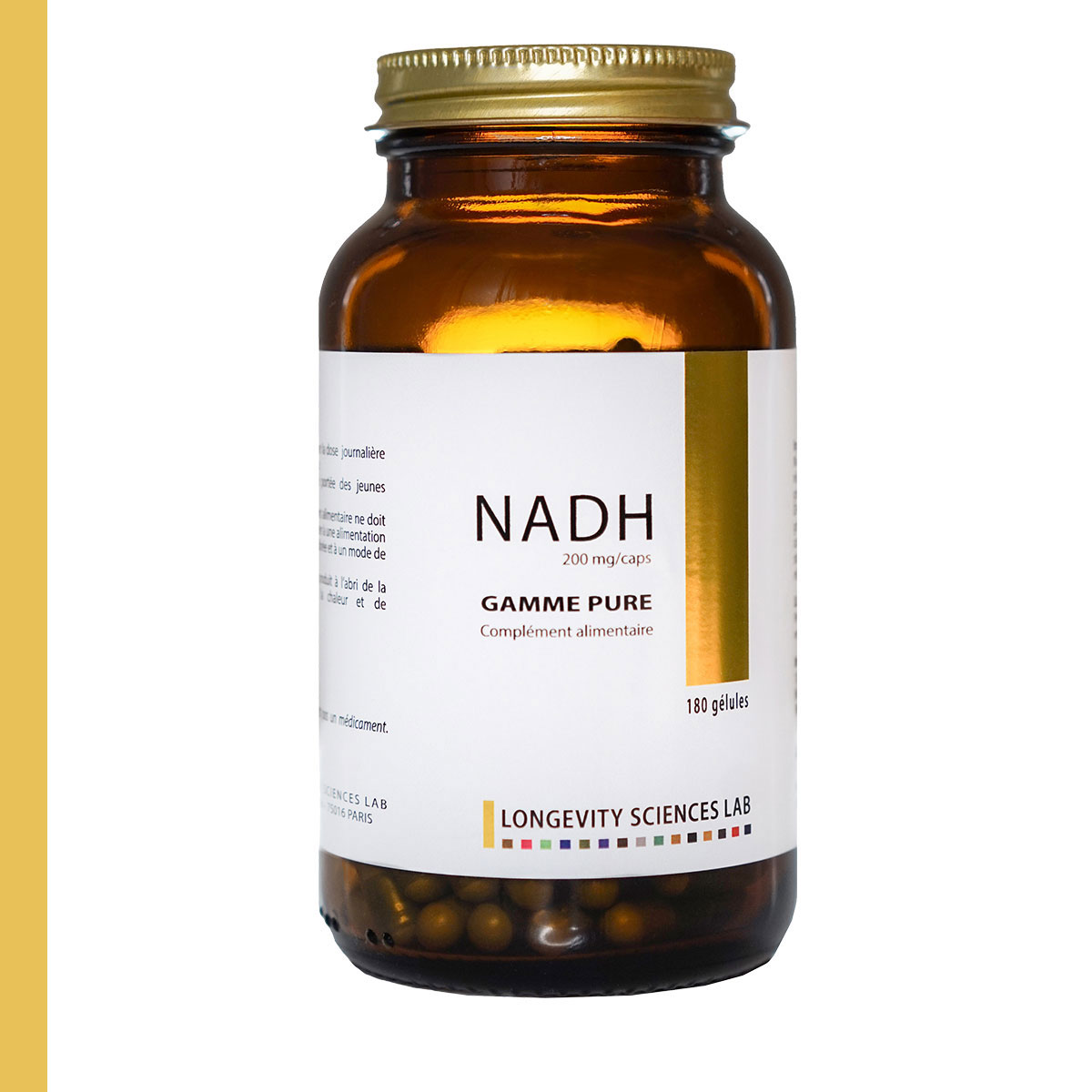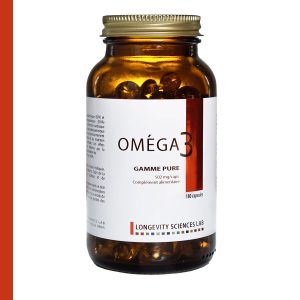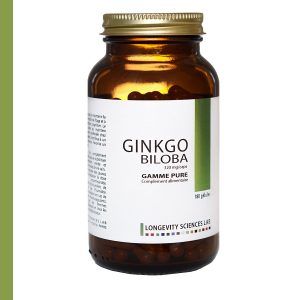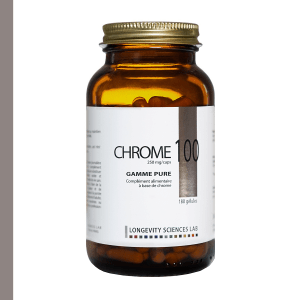Description
énergie cellulaire
Cognition
concentration
performances
antioxydant

cardiovasculare
mémoire
immunité
acuité
Consultez notre page dédiée à la NADH et apprenez en plus sur cette molécule

Propriétés dE LA NADH
La NADH (nicotinamide adénine dinucléotide réduit) est une coenzyme biologique essentielle pour le métabolisme énergétique de toutes les cellules vivantes.
La NADH est produite lors de la dégradation des aliments, notamment des glucides, des lipides et des protéines par certains métabolismes cellulaires. Elle est ensuite utilisée dans les mitochondries pour produire de l’ATP (adénosine triphosphate), qui est la principale source d’énergie pour les cellules.
La NADH est une petite molécule composée de deux nucléotides, l’adénine et le ribose, ainsi que de deux groupes phosphate et d’un groupe nicotinamide. Le groupe nicotinamide est la partie active de la molécule qui permet à la NADH d’accepter et de donner des électrons dans les réactions de réduction-oxydation (redox). La NADH est capable de transférer deux électrons et un proton (H+) lors de ces réactions, ce qui lui permet de se transformer en NAD+ (nicotinamide adénine dinucléotide) oxydé.

ÉNERGIE
Le NADH agit en tant que donneur d’électrons dans la chaîne respiratoire mitochondriale, une série de réactions biochimiques qui se déroulent dans les mitochondries, les centrales énergétiques des cellules. Dans cette chaîne respiratoire, le NADH transfère des électrons à des enzymes spécifiques, ce qui permet la production d’ATP par phosphorylation oxydative. L’ATP est la molécule responsable de la fourniture d’énergie aux processus cellulaires essentiels.
BIENFAITS CARDIOVASCULAIRE
Les correcteurs de NADH, en plus de leurs autres avantages, ont également démontré des effets bénéfiques sur la santé cardiovasculaire. Le NADH, ou dinucléotide de nicotinamide et d’adénine, joue un rôle crucial dans la fonction des cellules endothéliales, qui tapissent les parois des vaisseaux sanguins. Ces cellules jouent un rôle clé dans la régulation de la vasodilatation, de la pression artérielle et de l’équilibre de lipides dans le sang.


FONCTIONS COGNITIVES
En augmentant les niveaux d’ATP dans le cerveau, le NADH favorise une activité neuronale optimale. Cela se traduit par une amélioration de la concentration, de la clarté mentale et de la cognition. L’ATP fournit l’énergie nécessaire aux processus de communication entre les cellules cérébrales, ce qui facilite le traitement de l’information, la réflexion rapide et la résolution de problèmes.
SYSTÈME IMMUNITAIRE
Les correcteurs de NADH peuvent jouer un rôle crucial dans le renforcement du système immunitaire en améliorant la réponse immunitaire de l’organisme. Le NADH, en tant que coenzyme essentielle dans la production d’énergie cellulaire, est particulièrement important pour les cellules du système immunitaire, telles que les lymphocytes et les macrophages, qui sont responsables de la protection de l’organisme contre les infections et les maladies.


INFLAMMATION ET STRESS OXYDATIF
Les correcteurs de NADH ont fait l’objet d’études visant à évaluer leur capacité à réduire l’inflammation et le stress oxydatif. Le NADH joue un rôle essentiel en tant que cofacteur pour certaines enzymes antioxydantes présentes dans l’organisme, notamment la superoxyde dismutase. Ces enzymes antioxydantes sont responsables de la neutralisation des radicaux libres, des molécules hautement réactives qui peuvent causer des dommages oxydatifs aux cellules.

180 gélules
100 MG DE NADH PUR
6 mois de cure
dosage d’une prise quotidienne pour 6 mois de traitement
Nos produits sont fabriqués en plein cœur de la France, dans le Val de Loire.
De par nos laboratoires partenaires, tous nos produits sont certifiés Agriculture Biologique.
Exclusivement composé de produits naturels, notre produit est garanti sans additifs et sans OGM.
La galénique de nos produits a été étudiée avec la plus grande expertise, afin de permettre une action optimale de nos correcteurs physiologiques pour votre bien-être.
En respectant le dosage indiqué, notre correcteur physiologique vous coûtera 163 € par mois.
Avec Longevity Sciences Lab
Investissez dans votre santé
Métabolisme du NADH et ses rôles dans les processus cellulaires au cours de la sénescence
Le NADH influence de nombreuses fonctions cellulaires clés, comme la réparation de l’ADN, la sénescence cellulaire et la fonction des cellules immunitaires. Ces processus et fonctions cellulaires sont essentiels au maintien de l’homéostasie tissulaire et métabolique, c’est-à-dire l’équilibre fonctionnel du corps. La sénescence s’accompagne d’une baisse progressive de NAD+ aux niveaux tissulaire et cellulaire et cette baisse est liée à de nombreuses maladies associées au vieillissement, notamment le déclin cognitif, le cancer, les maladies métaboliques et la sarcopénie, c’est-à-dire la fonte de muscles qui apparaît avec l’âge. Bon nombre de ces maladies associées au vieillissement peuvent être ralenties et même inversées en rétablissant les niveaux de NAD+. Par conséquent, le métabolisme du NAD+ est apparu comme une approche thérapeutique pour les maladies liées à la sénescence et prolonger la santé humaine. (1)
Par ailleurs, de faibles niveaux de NAD+ ont été liés à des problèmes de santé tels que le vieillissement et les maladies chroniques. Concernant ces maladies il s’agit particulièrement du diabète, des maladies cardiaques, de la maladie d’Alzheimer et la perte de vision. (2)
Le NADH, soutien de la fonction cérébrale
Le NADH peut aider à l’amélioration de la fonction cognitive et la mémoire, ainsi que réduire la fatigue mentale. Elle est également utilisée pour soutenir la santé du cerveau chez les personnes atteintes de troubles neurologiques tels que la maladie d’Alzheimer et la maladie de Parkinson.
Une étude a publié les résultats d’un suivi de 885 patients ayant Parkinson. Environ la moitié des patients ont reçu du NADH par perfusion intraveineuse, l’autre partie par voie orale en gélules. Chez environ 80 % des patients, un effet clinique bénéfique a été observé. 19,3 % des patients ont montré une très bonne amélioration du handicap, 58,8 % une amélioration plus modérée. De plus, les patients plus jeunes et les patients dont la durée de la maladie est plus courte ont de meilleurs résultats que les autres. Par ailleurs, la forme de NADH appliquée par voie orale a entraîné une amélioration globale du handicap comparable à celle de la forme appliquée par voie parentérale. (3)
Le NADH préserve le système cardiaque
Le NADH peut aider à réduire l’inflammation et le stress oxydatif, ce qui peut contribuer à améliorer la santé cardiovasculaire.
L’insuffisance cardiaque est une forme très répandue et intraitable de décompensation cardiaque. Il s’agit d’une complication de l’insuffisance cardiaque et qui peut avoir de graves conséquences. Cette pathologie est couramment associée à un dysfonctionnement diastolique, ce qui signifie que le coeur se remplit de sang avec d’importantes variations par rapport à un sujet sain. Par ailleurs, ce dysfonctionnement est associé à un déficit cardiaque en nicotinamide adénine dinucléotide (NAD+). Une étude datant de 2021 a démontré que lorsqu’il y a une hausse de NAD+ par supplémentation orale, il y a une pression artérielle plus basse et un risque réduit de mortalité cardiaque. Ainsi, le NADH permet de contribuer à améliorer la santé cardiovasculaire (4)
Le NADH, efficace pour le renforcement immunitaire et pour réduire la fatigue chronique
Le NADH est un coenzyme qui est essentiel pour la production d’énergie dans les cellules. Elle peut aider à augmenter les niveaux d’énergie et à améliorer la fonction mitochondriale.
Une étude a été menée pour connaître l’efficacité du NADH chez des patients atteints du syndrome de fatigue chronique (SFC). Le SFC est une affection potentiellement invalidante dont l’origine est inconnue. Bien que sa présentation clinique soit associée à beaucoup de symptômes, la fatigue est une constatation universelle et essentielle pour son diagnostic. L’étude en double aveugle ont démontré que les patients ayant reçu du NADH ont eu une réduction spectaculaire et statistiquement significative du score moyen des symptômes au cours du premier trimestre. Par ailleurs, des niveaux élevés d’anticorps IgG et IgE ont été trouvés chez un nombre important de patients. Les IgG et IgE sont des anticorps qui défendent activement l’organisme contre les souches pathogènes, ils sont donc directement impliqués dans la défense immunitaire. Le NADH a une action bénéfique contre la fatigue, mais permet aussi de renforcer le système immunitaire en augmentant la production de certaines cellules immunitaires et en améliorant la réponse immunitaire. (5)
Le NADH, un allié de la santé visuelle
Le NADH est un cofacteur et un composé organique essentiel à la survie neuronale. Le glaucome est une maladie neurodégénérative courante dans laquelle les niveaux neuronaux de NAD+ diminuent. Cette perturbation métabolique est prévenue par le nicotinamide. Une étude a démontré que le nicotinamide a des effets neuroprotecteurs envers le glaucome humain. (6) Une autre étude implique le NAD+ dans la préservation de la santé visuelle et de la fonction rétinienne et souligne l’importance du métabolisme du NAD+ dans la rétine normale, vieillissante et/ou malade. (7)
AJ Covarrubias, R Perrone, E Grozio, E Verdin, metabolism and its roles in cellular processes during ageing, Nature reviews. Molecular cell biology, December 2022
S Johnson, SI Imai, NAD + biosynthesis, aging, and disease, F1000Research, February 2018
JG Birkmayer, C Vrecko, D Volc, W Birkmayer, Nicotinamide adenine dinucleotide (NADH)–a new therapeutic approach to Parkinson’s disease. Comparison of oral and parenteral application, Acta neurologica Scandinavica. Supplementum, 1993
M Abdellatif, VT Harbst, F Koser, Nicotinamide for the treatment of heart failure with preserved ejection fraction, Science translational medicine, February 2021
ML Santaella, I Font, OM Disdier, Comparison of oral nicotinamide adenine dinucleotide (NADH) versus conventional therapy for chronic fatigue syndrome, Puerto Rico health sciences journal, June 2004
J R. Tribble, A Otmani, S Sun Nicotinamide provides neuroprotection in glaucoma by protecting against mitochondrial and metabolic dysfunction, Redox Biololgy,43, July 2021
RN Jajeda, MC Thounaojam, M Bartoli, PM Martin, Implications of NAD + Metabolism in the Aging Retina and Retinal Degeneration, Oxidative medicine and cellular longevity, May 2020






